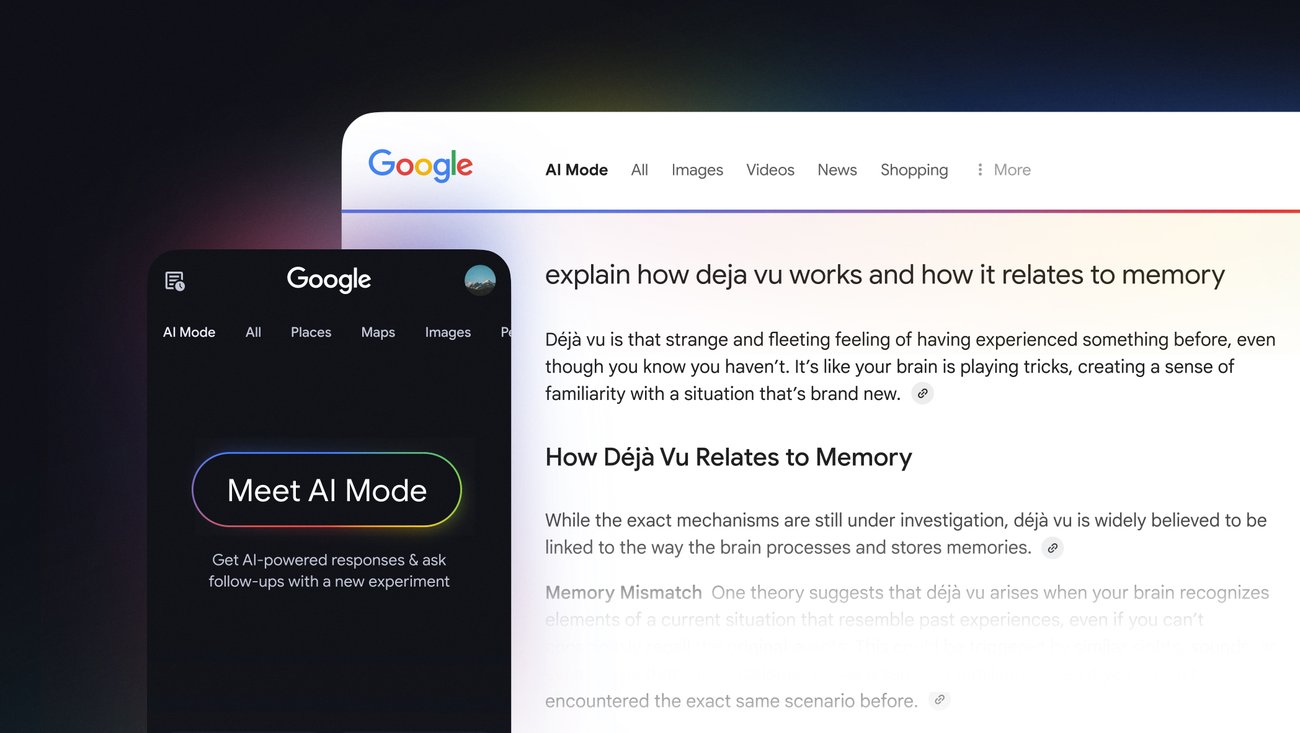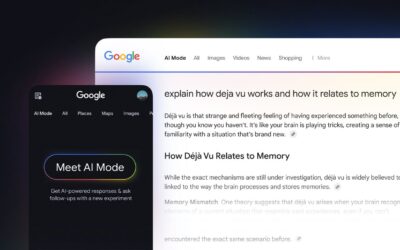For the last 20 years, Google has shaped how we interact with online information. The process was simple: you searched for something, got a list of links, and clicked to find your answer. This “blue links” model has been the foundation for SEO, digital marketing, and building authority for businesses, founders, and co-founders.
Today, that model is undergoing a radical change. Google AI Mode isn’t just an update—it’s a revolution that’s transforming how we search for, consume, and interact with information.
What is Google AI Mode and how does it work?
Google AI Mode is an evolution of Google Search that adds a layer of generative artificial intelligence to the search experience. Unlike the classic model, which organizes links based on keywords, AI Mode uses Large Language Models (LLMs) to interpret the user’s intent and generate complete, contextual, and dynamic answers directly within the search engine.
AI Mode vs. AI Overview: What’s the difference?
The Search Engine Results Page (SERP) is the page of results that appears when you search on Google or other search engines. One of the most significant changes with AI Mode is how these results are presented. Google no longer just wants to show you links; it wants to provide complete, contextual answers. This makes the search experience more fluid and direct, reducing the need for multiple clicks and making searching more intuitive.
It’s important to note that AI Mode doesn’t completely replace what was previously known as AI Overview.
AI Mode provides more detailed, interactive, and conversational answers. It can replace some traditional search results and offer contextual information in a fluid way.
AI Overview offers quick, summarized, and static answers that help users get an initial understanding of a topic.
How AI Mode operates
The technology behind AI Mode is Gemini 2.0, which enables a more precise interpretation of a user’s intent and generates personalized responses. This means Google doesn’t just direct users to websites; it synthesizes information from multiple sources and presents a clear, ready-made, and personalized answer.
For example:
- If you search for “best hotels in São Paulo,” instead of getting a list of websites, you receive a summary with recommendations, price comparisons, and reviews.
- If you search for the “difference between vitamin D2 and D3,” the response is objective, comparative, and direct, with no need to navigate through various scientific articles.
In addition, AI Mode offers:
- Conversation Continuity: You can refine your searches without starting over.
- Multimodal Experience: It combines text, images, charts, and dynamically generated videos.
- Google Shopping Integration: Product results, prices, and reviews appear directly in the answer.
What to do about the drop in clicks and Its impact on businesses
The signs of this transformation are already evident. Recent studies show a drop of over 45% in clicks relative to impressions. Users are still looking for information, but they often don’t need to click on links to get what they want.
What’s most striking is that for searches with a buying intent, the drop in clicks doesn’t decrease consumer interest. This indicates that the traditional sales funnel and lead generation model no longer works as it used to. For founders, co-founders, and businesses, this is a wake-up call: those who don’t adapt may lose relevance, while those who understand and anticipate this shift can gain a strategic advantage.
The impact of Google AI Mode on SEO
With AI Mode, classic SEO needs to adapt. While you don’t need to dive into complex techniques, it’s essential to understand that having relevant and authoritative information within the AI’s answers has become crucial. Well-structured, original, and up-to-date content is still prioritized, but how it appears in searches has changed.
This leads to the emergence of GEO (Generative Engine Optimization). GEO is the practice of optimizing content so that generative AIs choose to display your brand or information in their responses. It’s an evolution of SEO that aims to insert information directly into AI-generated answers, ensuring your brand is cited, referenced, and relevant to the end-user.
How businesses are impacted by Google AI Mode
The arrival of Google AI Mode is transforming every sector in a unique way, requiring personalized strategies for companies to continue being recommended organically and scalably.
E-commerce and Retail
For e-commerce, the integration with Google Shopping within AI Mode significantly changes the shopping journey. Consumers can discover, compare, and buy products directly through the AI interface, often without visiting the brand’s website. This reduces friction but also decreases a company’s control over the user experience.
It’s essential to structure product information in detail, including complete descriptions, technical specifications, reviews, and clear comparisons with competitors. The quality of reviews and your online reputation become strategic factors for appearing in AI-generated responses and influencing purchasing decisions.
B2B Services and Consulting
B2B service companies face challenges related to demonstrating authority and expertise. AI Mode favors organizations that offer exclusive content, proprietary data, and in-depth analysis not widely available online. Having detailed case studies, reports, and unique insights becomes a strategic asset. These elements increase the chances of the AI citing your company as a reference, strengthening credibility and generating more qualified business opportunities.
Content and Media
Media outlets and content creators face a new risk: AI can synthesize information without generating significant traffic to the original sources. This directly impacts revenue models based on audience size.
The strategy to stand out involves creating unique and exclusive content with deep analysis, unique perspectives, or experiences that cannot be easily replicated by automated systems. Investing in the personal brand of journalists and experts, newsletters, proprietary platforms, and premium content is crucial to ensure visibility and authority, even in the face of automated synthesis.
How to get cited in Google AI Mode
To be cited in Google AI Mode, you need to focus on Generative Engine Optimization (GEO) strategies that go beyond traditional SEO. Google AI Mode uses a technique called “query fan-out,” which sends out multiple related searches at the same time and gathers the results to provide more comprehensive answers.
Here are five key strategies:
- Highlight specific content snippets. AI Mode tends to value clear passages that directly answer specific questions. This means creating objective content that addresses different aspects of a topic, such as sub-questions or related doubts.
- Strengthen your brand’s presence. The concept of “Fame Engineering” involves building a recognizable and trustworthy digital presence. The more your brand is seen as an authority, the greater the chance of it being cited by AIs.
- Use structured markup (Schema). Implementing schema markup helps the AI understand the context of your content. Useful types include
FAQPage(questions and answers),HowTo(step-by-step guides),Product/Service(product or service details),Article/NewsArticle(journalistic content), andReview(ratings and reviews). Using JSON-LD markup is the most recommended method to ensure the AI correctly interprets your content.
- Produce original and reliable content. Exclusive and in-depth content stands out. Original data, detailed analyses, or interviews with experts increase your authority and the likelihood that the AI will cite your brand.
- Maintain digital consistency. A solid and consistent online presence is essential. This includes optimized websites, updated social profiles, and mentions from reliable sources, all of which strengthen your brand’s reputation and make it easier for the AI to cite you.
Google AI Mode is not just an update; it’s a revolution that’s redefining how we search for information and how businesses connect with customers.
The traditional link model is losing ground, and digital relevance now depends on being present in the intelligent responses of AIs. For businesses that want to remain visible, competitive, and ahead of the curve, acting now isn’t an option—it’s a necessity.
💡See how First Answer can help your company stand out in Google AI Mode and across all major AIs.



